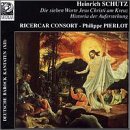| All Artists: Schutz Title: 7 Words of Christ on the Cross Members Wishing: 1 Total Copies: 0 Label: Ricercar Release Date: 9/23/2000 Genre: Classical Styles: Opera & Classical Vocal, Chamber Music, Historical Periods, Baroque (c.1600-1750), Classical (c.1770-1830), Sacred & Religious Number of Discs: 1 SwapaCD Credits: 1 UPC: 789368722723 |
Search - Schutz :: 7 Words of Christ on the Cross
 | Schutz 7 Words of Christ on the Cross Genre: Classical
These are the first real masterpieces in the German oratorio tradition that culminates in Bach's Passions. Each work begins and ends with a chorus, but there are no arias: the Evangelist(s) and the characters speak in a... more » |
Larger Image |
CD Details
Synopsis
Amazon.com
These are the first real masterpieces in the German oratorio tradition that culminates in Bach's Passions. Each work begins and ends with a chorus, but there are no arias: the Evangelist(s) and the characters speak in accompanied, and often tuneful, recitativo arioso. The brief, affecting Seven Last Words uses four Evangelists (singing separately and together); the Easter oratorio uses only one Evangelist but duo singers for Jesus and Mary Magdalene. The Ricercar Consort gives by far the best recorded performances of these pieces, slighting neither the beautiful melodies nor the narrative momentum. The flawless cast includes three of the most beautiful and intelligently used voices in the early music world: Agnès Mellon, Mark Padmore and the extraordinary Paul Agnew. --Matthew Westphal

 Track Listings (14) - Disc #1
Track Listings (14) - Disc #1